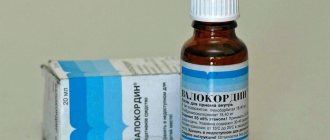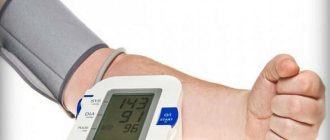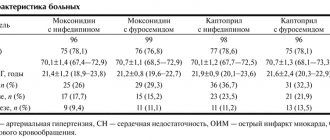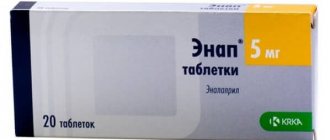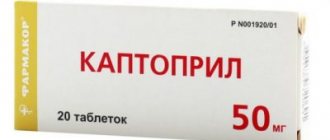Updated: 04/23/2021 15:13:41
Expert: Abramova Tsilya
Corinfar and Capoten are first aid drugs in the treatment of hypertensive crisis. They quickly reduce blood pressure: after 15-30 minutes the condition improves, accompanying symptoms go away: headache, hot flashes, etc. The effect of using the drugs lasts up to 4-6 hours. Kapoten and Corinfar should be in the home medicine cabinet of every hypertensive patient - in case of unexpected surges in blood pressure.
The experts of our magazine studied the composition and principle of action of the drugs, reviewed numerous clinical studies and found that both drugs are equally often used in the treatment of hypertension. We cannot say for sure which drug is better. Practice shows that some hypertensive patients tolerate Capoten well, others prefer Corinfar - and it is quite difficult to predict the body’s reaction in advance. But it is important to remember: Capoten acts more gently, the effect occurs a little later, and adverse reactions develop less frequently. Corinfar is more aggressive - it lowers blood pressure faster, but more often causes undesirable effects.
In this article we will tell you how the drugs work, when they are prescribed and how they are tolerated. Read on for a comparison between Corinfar and Kapoten.
For the heart and blood vessels: how they work
The action of each drug can best be told by its active substances. The operating principle of Kapoten and Corinfar is different, but the effect is the same. Both drugs, when ingested, are absorbed into the bloodstream, dilate blood vessels and lower blood pressure.
Kapoten
Captopril works against angiotensin II. Normally, this protein is formed in the blood from angiotensin I under the action of the ACE enzyme. Angiotensin II enhances the synthesis of aldosterone, one of the hormones of the adrenal cortex. As a result, the arteries and veins narrow and blood pressure rises.
Capoten acts on ACE (angiotensin-converting enzyme), the main link in the synthesis of angiotensin II. The blood vessels dilate and blood pressure decreases. Other associated effects are also noted:
- reduces total peripheral resistance of blood vessels;
- reduces preload and afterload on the heart;
- reduces pressure in the pulmonary circulation;
- reduces the synthesis of aldosterone in the adrenal glands.
Capoten is one of the old antihypertensive drugs. Its effectiveness has been confirmed by practical experience (since 1979) and scientific tests. In one study, the authors compared the effects of captopril and magnesium sulfate in myocardial infarction. Taking captopril has been shown to reduce mortality in this disease. In another paper, researchers indicated that captopril can be taken not only for emergency treatment, but also for a long course. This effect of the drug is used in the treatment of chronic heart failure, diabetic nephropathy and other similar conditions.
In the PubMed database, more than 13 thousand publications are devoted to captropril. One of the presented articles shows the benefits of the drug for left ventricular dysfunction and myocardial infarction. The authors of many studies emphasize that the effect of captopril is dose dependent. It can be managed by increasing the dosage of the drug. The likelihood of side effects also depends on the dosage regimen. The higher the dose, the greater the risk of complications.
Corinfar
Nifedipine blocks the functioning of slow calcium channels. It reduces the flow of calcium into the cells of the heart muscle and peripheral arteries. When prescribed in high doses, it prevents the release of calcium from the depot. By normalizing the calcium flow, it has its effect:
- increases blood circulation in the coronary arteries supplying the heart;
- improves blood flow in the myocardium during ischemia;
- activates bypass blood flow through collateral vessels;
- dilates peripheral arteries and does not affect the condition of the veins;
- reduces vascular resistance;
- reduces the tone of the heart muscle;
- reduces afterload on the heart;
- reduces myocardial oxygen demand - this is important after a heart attack;
- increases blood flow in the kidneys.
In the PubMed database, more than 23 thousand articles are devoted to nifedipine. According to WHO recommendations, this drug, like other calcium antagonists, is the drug of choice in the treatment of hypertension. Its effectiveness has been confirmed by numerous scientific studies. They show that nifedipine reliably reduces blood pressure - by 8-10% after 20-30 minutes and by 17-20% after 1.5-2 hours. These data allow us to recommend a calcium channel blocker as a good first aid treatment for arterial hypertension.
Kapoten
Available in tablet form (25 or 50 mg). The manufacturing company determines the shape and appearance of the tablets.
The main active substance is captopril , which expands the lumens in blood vessels and reduces blood pressure.
The medicinal product is classified as an ACE inhibere. Its effect prevents the formation of angiotensin ||. By doing this, the gaps in the arteries and veins increase, and the pressure drops.
The therapeutic effect occurs after an hour. 75% of the substance is absorbed. Excreted by the urinary system. Patients with elevated levels of urea and creatinine should consult a physician.
The dosage is determined individually, depending on blood pressure and symptoms of the disease. The main thing is not to exceed 150 mg per day . The time of administration does not depend on food consumption.
Capoten can be harmful in case of hypersensitivity to captopril, ACE inhibitors, persons with a hereditary predisposition to Quincke's edema, and liver and kidney dysfunction.
The drug is not prescribed to pregnant and lactating women.
There is a danger of overdose, which leads to a sharp decrease in blood pressure. Treatment consists of hemodialysis and the introduction of plasma expanders.
Capoten can cause adverse reactions in the form of: anemia, thrombocytopenia, the appearance of blood in the urine, tachycardia, acidosis, weight loss, aphthous stomatitis, abdominal pain. From the skin: rashes, itching.
First aid for hypertension
If your blood pressure is high, you should:
- Stop physical activity.
- Take a comfortable position, sitting or reclining.
- Take one tablet: Capoten (25 mg) or Corinfar (10 mg).
- Measure blood pressure every 20-30 minutes.
- If after an hour the pressure does not drop below 180/100 mmHg. Art., take another tablet - Kapoten or Corinfar.
- If after repeating the pill there is no effect, call an ambulance.
- If the pressure rises after 30 minutes while taking the drug, chest pain, severe headaches, and confusion appear, call an ambulance.
Corinfar acts faster - the effect occurs 20 minutes after taking the drug and lasts up to 5-6 hours. The maximum concentration of nifedipine in the blood is achieved after 1.5-2 hours.
The hood works more slowly - the pressure drops after 30-40 minutes. The maximum concentration in the blood was observed after 1-1.5 hours. The effect lasts up to 4-6 hours. Eating slows down the effect of captopril by 30%.
When are they appointed?
We studied the instructions for use of the drugs and found that their scope of action varies. There is only one similarity - both drugs are prescribed for high blood pressure:
- The initial dose of Capoten is 12.5 mg (1/2 tablet). If necessary, the dosage of the medication is gradually increased. The maximum daily dose is 150 mg.
- Corinfar is started with 10 mg (1 tablet) 2-3 times a day. According to indications, the dosage is doubled. The maximum daily dose is 40 mg.
- Capoten is prescribed not only for hypertension. It is also used in other situations:
- complex therapy of chronic heart failure;
- left ventricular dysfunction after myocardial infarction;
- diabetic nephropathy.
Corinfar is used only for arterial hypertension and angina pectoris. The drug has no other indications.
Reduce blood pressure and stop the heart: which drug is dangerous?
Let's look at the dangers of taking antihypertensive drugs.
Corinfar
The European Society of Cardiology warns that nifedipine in the drug Corinfar can cause sudden cardiac arrest. This was reported by Dr. Hanno Tan, cardiologist, leader of the ESCAPE-NET project (original article on the EurekAlert website). He said that the use of nifedipine in high doses (more than 60 mg per day) can lead to a sad outcome.
The study's author cautions that the results should be interpreted with caution. It is not yet clear whether the risk is so high, because nifedipine has been used by cardiologists for many years and has proven itself in the treatment of hypertension and angina. It is possible, emphasizes Dr. Hanno Tan, that previously scientists did not have the necessary data - after all, cardiac arrest usually occurs outside a hospital setting and is difficult for targeted study.
Corinfar also causes other side effects. The list is impressive - the drug acts on almost all organs and systems. Practicing doctors note that most often, while taking Corinfar, an increase in heart rate, headaches, and loss of consciousness are observed. The drug is difficult to manage - many patients experience an uncontrolled sharp decrease in blood pressure during treatment. If the dosage is exceeded, angina attacks may develop, and in rare cases, myocardial infarction.
Corinfar is not prescribed:
- in the first 4 weeks after myocardial infarction;
- with unstable angina;
- in the stage of decompensation of chronic heart failure;
- with cardiogenic shock.
Corinfar is prohibited in the first trimester of pregnancy and during lactation.
It is important to remember: Corinfar is not prescribed for more than three months in a row. With long-term use, tolerance to the drug develops - it stops lowering blood pressure.
Kapoten
Capoten is better tolerated and less likely to cause unwanted side effects. It practically does not lead to tachycardia and rhythm disturbances, but can cause a dry, unproductive cough. Causes nausea, drowsiness, and lowers mood. May lead to the development of an allergic reaction.
Capoten can lead to a sharp decrease in blood pressure. But this effect is rare and is usually associated with exceeding the dosage. If the patient takes 2-3 tablets at once, the pressure may drop to 90/60 mmHg. Art. and below. Loss of consciousness is possible.
Capoten is not prescribed during pregnancy and lactation, in case of severe pathology of the kidneys and liver.
What do drugs have in common?
Both drugs significantly affect blood vessels, dilating them, which leads to a decrease in blood pressure. Used in the treatment of diseases of the circulatory system.
Medicines are quickly and almost completely absorbed into the gastrointestinal tract. For elimination from the body, the main burden falls on the kidneys.
Both drugs have many contraindications and side effects . Both are taken strictly in certain doses, as they can lead to undesirable consequences.
conclusions
Our verdict:
- Kapoten and Corinfar are equally often prescribed as first aid for high blood pressure. They cope with their task equally effectively.
- The drugs have different areas of application besides hypertension. Corinfar can be used for angina pectoris. Capoten is prescribed in the complex therapy of heart failure.
- Corinfar acts faster - it reduces blood pressure in 15-20 minutes. The hood starts working in 20-30 minutes.
- Capoten is better tolerated and less likely to cause side effects. Corinfar sharply reduces blood pressure, increases heart rate, and can lead to cardiac arrest.
Corinfar and Kapoten are familiar tablets from the home medicine cabinet for hypertensive patients, but they are not safe. Antihypertensive drugs can only be taken as prescribed by a doctor. If your blood pressure rises, consult a therapist and get examined. The doctor will tell you exactly which drug can be taken in your situation.
What is the difference
Manufactured by Capoten in France, and Nifedipine in Ukraine.
Medicinal products differ in composition, including different active ingredients . For this reason, they can be found in more than one pharmacological group.
Each of them is prescribed individually and for certain diseases of the cardiovascular system that cause an increase in blood pressure.
When treated with Capoten, the risk group includes patients with various disorders of the kidneys and liver. Patients with various forms of heart failure remain vulnerable when treated with Nifedipine.
It is important to avoid self-medication with any drug. The dosage can only be determined by the attending physician, based on the indicators.
